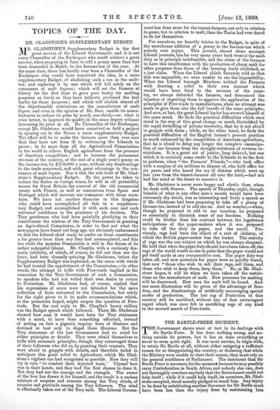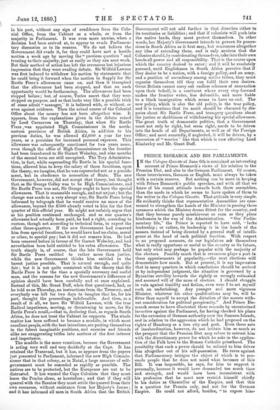THE BARTLE-FRERE INCIDENT.
THE Government shows want of tact in its dealings with Sir Bartle Frere. It has done nothing wrong, and no- thing outside its powers, but it has so done everything as never to seem quite right. It was most unwise, to begin with, to retain Sir Bartle at all, without either assigning a sufficient reason for so disappointing the country, or declaring that while the Ministry were unable to state their reason, they must rely on the general confidence of Parliament. The statement that Sir Bartle Frere is necessary forthe moment,because he may possibly carry Confederation in South Africa, and nobody else can, does not thoroughly convince anybody that the Government could not help itself ; while if it could help itself, its members, Mr. Glad- stone excepted, stood morally pledged to recall him. Any injury to be done by substituting another Governor for Sir Bartle must have been less than the injury done by maintaining him in his post, without any sign of confidence from the Colo- nial Office, from the Cabinet as a whole, or from the majority in Parliament. It was even more unwise, when a decision had been arrived at, to appear to evade Parliamen- tary discussion as to its reasons. We do not believe the Government did evade it, for they could have met a hostile motion a week ago by moving the " previous question" and trusting to their majority, just as easily as they can next week. But their method of action has left the erroneous but injurious impression that they were evading debate. Sir Wilfrid Lawson was first induced to withdraw his motion by statements that he could bring it forward when the motion in Supply for Sir Bartle Frere's allowances came on, and then it transpired that the allowances had been stopped, and that no such opportunity would be forthcoming. The allowances had been stopped before ; but, of course, Tories assert that they were stopped on purpose, and as that looks very like a possible trick of some adroit "manager," it is believed with, or without, or even against evidence. Then the actual course of the Colonial Office about the money has not been altogether wise. It appears, from the explanations given in the debate raised by Lord Carnarvon on Thursday, that when Sir Bartle Frere ,.was appointed High Commissioner in the north- eastern provinces of British Africa, in addition to his previous duties, he was allowed £2,000 a year for two years, as a provision for increased personal expenses. This allowance was subsequently sanctioned for two years more, even though the office of High Commissioner on the frontier had been transferred to Sir Garnet Wolseley, and nine months of the second term are still unexpired. The Tory Administra- tion, in fact, while superseding Sir Bartle in his special func- tions, allowed him to keep the salary of those functions, upon the theory, we imagine, that he was superseded not as a punish- ment, but in obedience to necessities of State. The new Government, however, did not accept that theory, but thought that as Sir George Colley was to be High Commissioner, and Sir Bartle Frere was not, Sir George ought to have the special allowances. That is reasonable enough, and not unjust ; but the change was made in a very abrupt way, Sir Bartle Frere being informed by telegraph that he would receive no more of the allowance, beyond the £500 already voted to him for the first quarter of this official year. He might not unfairly argue that as his position continued unchanged, and as one quarter's allowance had actually been paid, he had a right, according to custom, though not according to technical form, to expect the other three-quarters. If the new Government had removed him from special functions, he would have had no claim, moral or other, to special pay ; but it did not remove him. He had been removed before in favour of Sir Garnet Wolseley, and had nevertheless been held entitled to his extra allowances. The truth simply is, of course, that the late Government held Sir Bartle Frere entitled to rather more than justice, while the new Government thinks him entitled to the barest justice possible. That is natural enough, and quite fair ; but it is not quite consistent with the theory that Sir Bartle Frere is for the time a specially necessary and useful man, and the reasons for the new Government's difference of opinion should have been carefully and at once explained. Instead of this, Mr. Grant Duff, when first questioned, had, as he told us on Thursday, no instructions from the Treasury, and everybody was left for two days to imagine that he, for his part, thought the proceedings indefensible. And then, as a result of it all, we have Sir Wilfrid Lawson, with the true Radical impatience, moving, or threatening to move, for Sir Bartle Frere's recall,—that is, declaring that, as regards South Africa, he does nottrust the Cabinet he supports. The whole matter has been suffered to become a muddle, in which most excellent people,with the best intentions, are putting themselves in the falsest imaginable positions, and enemies and friends alike are exaggerating trifles into matters of the first interest and importance.
The muddle is the more vexatious, because the Government is acting very well and very decidedly at the Cape. It has retained the Transvaal, but it has, as appears from the papers just presented to Parliament, informed the new High Commis- sioner that in that colony, as in Natal, a large measure of self- government must be conceded as rapidly as possible. The natives are to be protected, but the Europeans are not to be distrusted. It has warned the Cape Colonists that they must leave the Pondos alone, as heretofore ; and that if they will quarrel with the Basutos they must settle the quarrel from their own resources, without assistance from her Majesty's forces ; and it has informed all men in South Africa that the British Government will not add further in that direction either to its territories or liabilities ; and that if colonists will push into the native lands, they must protect themselves. In other words, her Majesty's Government intends to govern its posses- sions in South Africa as it best may, but renounces altogether any idea of extending them, and is only anxious that the Colonies should, by confederating themselves, take into their own hands all power and all responsibility. That is the course upon which the country desired to enter ; and it will be resolutely pursued, until Englishmen in South Africa perceive that if they desire to be a nation, with a foreign policy, and an army, and a position of ascendancy among native tribes, they must organise themselves till they can fulfil their own desires. Great Britain cannot carry out endless schemes of annexation upon their behalf, in a continent where every step forward makes the frontier wider, less defensible, and more liable to a black immigration which seems to have no end. The new policy, which is also the old policy, is the true policy, and it is vexatious that its merit should be obscured by dis- putes about Sir Bartle Frere, and trumpery questions about the justice or shabbiness of withdrawing his special allowance. The great truth of democratic politics, that a Government must not only be right, but seem right, needs to be driven into the heads of all Departments, as well as of the Foreign Office ; and most assuredly, if neglected, it will be driven, by a succession of " worries " like that which is now affecting Lord Kimberley and Mr. Grant Duff.



































 Previous page
Previous page